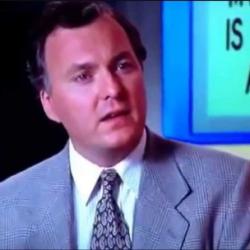You talk about utopianism and the ethics of rhetoric. Candidate Barack Obama used soaring language and utopian images. Do you think that he raised expectations so high that they could not possibly be met? Did he purchase an electoral victory at the cost of inevitable post-election disenchantment?
I agree with that. The rhetoric was so soaring, and so promising that it led, as you say, to a crash and great disappointment. What surprised a lot of people in this town was how quickly the disappointment came. And the disappointment came as well for people who are very much on the Left end of the spectrum. There are all kinds of disappointment in the Democratic party.
Some of that disappointment could have been dissipated if Obama had not overly inflated his promises and goals. It's a real art to call people to their highest aspirations and at the same time keep them grounded in a realistic sense of what the policy arena can solve and what it cannot.
There is something about President Obama's wonderful speaking style, the beauty of the rhetoric, and the historic significance of his own person and his election as President of the United States, that led to a whole cast of almost magical expectations of a historical moment. That may have blinded some people to the policies he championed as a young Senator.
Let's talk strategy. You help Christians learn how to engage the political arena fruitfully. Imagine a group of Christians who come to Washington to address the issue of sex trafficking. What moves would be wise and unwise in regards to aligning themselves with political parties or power structures?
One of the first moves has to be made before you even come to Washington -- and that's to come academically prepared. If your concern is sex trafficking, then you should become academically conversant with international law and international relations. Be prepared intellectually in the field of your concern.
Secondly, one of the problems we've had in this town is that there have been so many wonderful essays and books written about the life and career of William Wilberforce that many young Christian activists come to Washington to be the next Wilberforce. One has to remind them that Wilberforce took twenty to thirty years to accomplish what he did.
He was not aware of how important he was. He did not know that years later we'd be making movies about him. He was simply faithful in his calling. It's really important for people who come with high ideals to come to town and be faithful in their work. Too much stirring up of fervor around Wilberforcian ideals can lead to a great deal of disappointment. What we need to recover is a Reformed view of calling that says everybody should be faithful in his or her area. So if you're coming to town to work with International Justice Mission, they might need an FBI agent to investigate crimes on the ground, international lawyers to work with international laws related to trafficking, and writers to tell the stories of the victims of trafficking. These important ministries of justice need people with all kinds of gifts and skills, so what is urgent and important is to find where those gifts can best be used.
When I first came to town, Ronald Reagan was President. Many people came to town with the motto, "Ready, Fire, Aim." They really didn't have a working public philosophy undergirding their own personal faith. This again goes back to my own view about the need for an Augustinian sensibility, which is a real desire to be faithful and serious, and yet also to know when to pull back and realize that God is sovereign, His Providence is at work, and we're just instruments to do what we're called to do.
I was in meetings during the Reagan years with Christian Reconstructionists and theonomists who came to Washington and said, "We're going to take over America." Some of our friends and colleagues on the Left think that this is going on now. Actually, it's not going on now, but it was going on in the Reagan years. I attended those meetings, and they would have been frightening if they had possessed any power. They never had power; they never had anybody's ear. So the Randall Balmers of the world can worry all they want, but these people never controlled anything. They did talk that way, however, and they ended up leaving because they had an overinflated view of what the political could do.
So people need to come ready and prepared, but also have a Christian cast of mind that realizes that we are all called to be faithful in working for justice, in doing the best we can, but also in having an eschatological horizon ahead of us, realizing that it's not all in our hands.
One of the tricks of the trade these days is saying, like Jim Wallis, "I'm not conservative or liberal. I'm biblical." Or, "I'm neither right nor left. I'm Christian." That's not really helpful. People ought to know that faith transcends politics and political allegiances, but you really do have to make choices between relative goods and lesser evils. Party platforms matter, and you will want to align yourself with certain policy goals. So one has to get over the embarrassment of saying, "Yes, in light of my views on marriage and life, I am a conservative," or "because of my views about war and peace, yes, I am a liberal."





